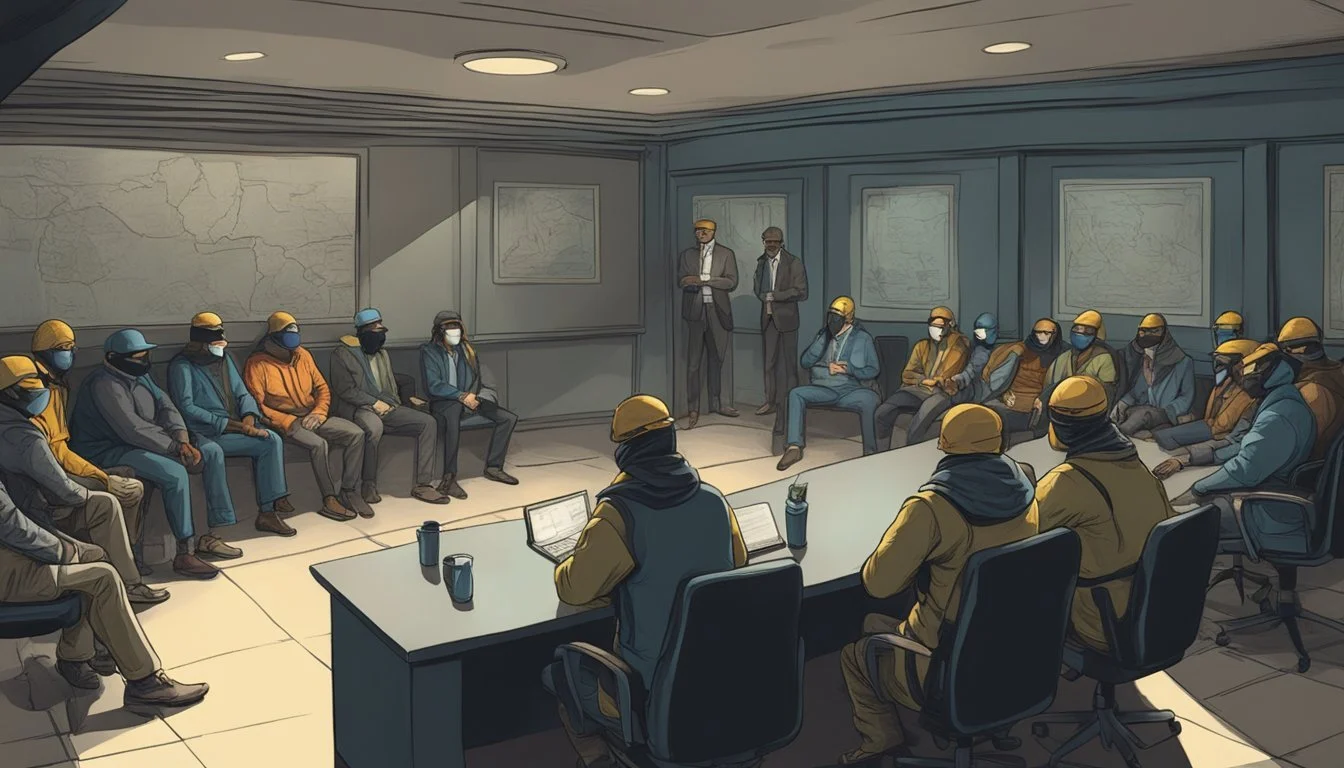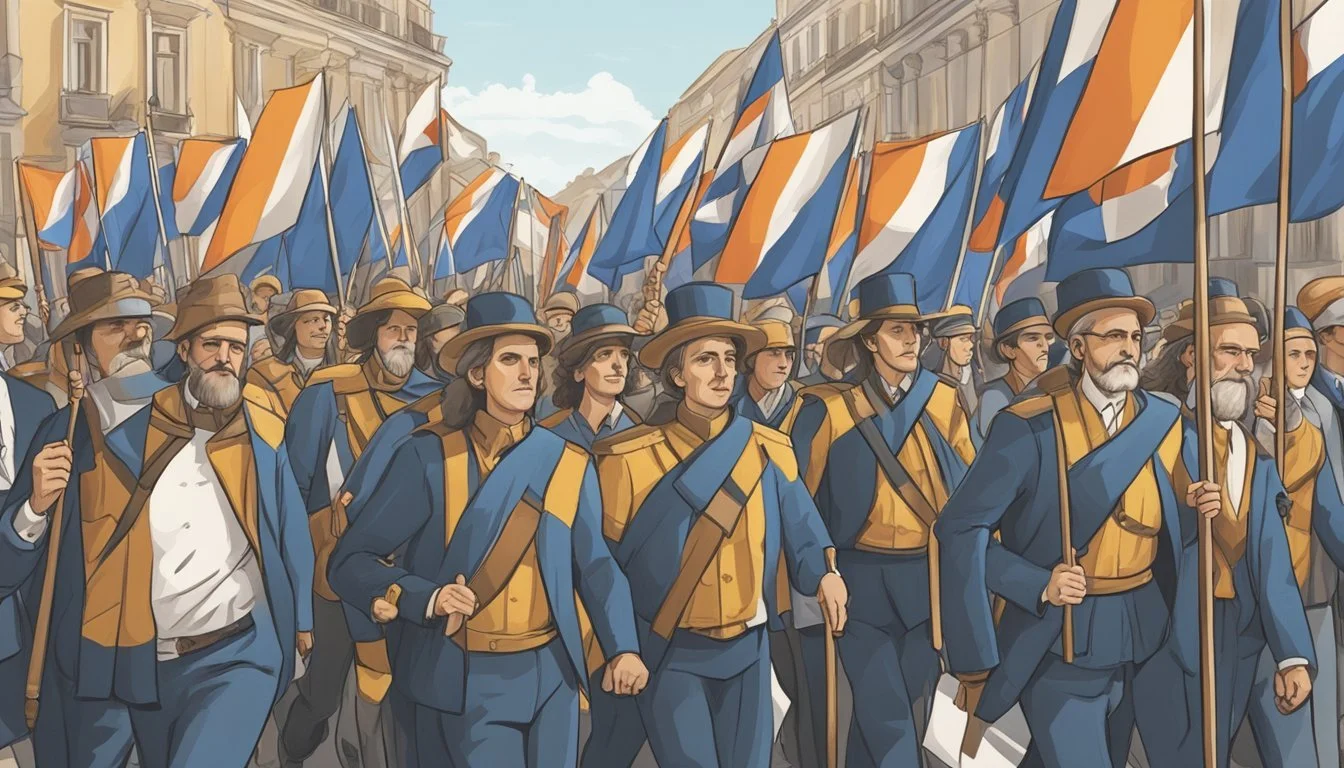5 Films Examining the Historical Context of ETA's Independence Movement
A Cinematic Journey Through Basque Nationalism
The Basque separatist group ETA's decades-long struggle for independence has left an indelible mark on Spanish history and society. This complex and contentious period has been explored through various cinematic lenses, offering audiences insight into the motivations, consequences, and human stories behind the conflict.
Five notable films provide unique perspectives on the historical context surrounding ETA's independence movement, shedding light on its impact on individuals, communities, and the broader political landscape. These works range from intense dramas to thought-provoking documentaries, each contributing to a deeper understanding of this turbulent chapter in Spain's recent past.
1) 'Yoyes' by Helena Taberna
'Yoyes' is a 2000 Spanish political drama directed by Helena Taberna. The film depicts the life of María Dolores González Katarain, known as Yoyes, a prominent female member of ETA.
The movie explores Yoyes' journey from her involvement with the Basque separatist organization to her eventual disillusionment. It portrays her years in exile and the challenges she faced upon returning to Spain.
Ana Torrent stars as Yoyes, delivering a nuanced performance that captures the complexity of her character's experiences. The film delves into the personal and political struggles Yoyes encountered as she attempted to reintegrate into society.
Taberna's direction provides a balanced perspective on the historical context of ETA's independence movement. The film examines the human cost of political violence and the difficulties of leaving a militant past behind.
'Yoyes' offers a unique lens through which to view the Basque conflict, focusing on the personal story of a woman caught between her past and her desire for a peaceful future.
2) 'The Invisible Guardian' by Fernando González Molina
'The Invisible Guardian' is a 2017 Spanish thriller film directed by Fernando González Molina. The movie is based on the novel of the same name by Dolores Redondo. It forms part of the Baztán Trilogy, which explores themes related to Basque culture and history.
The film follows Inspector Amaia Salazar as she investigates a series of murders in the Baztán Valley of Navarre. While the story does not directly focus on ETA, it touches on the complexities of Basque identity and the region's troubled past.
González Molina's direction creates a tense atmosphere that reflects the area's historical conflicts. The movie subtly references the impact of political tensions on local communities, providing insight into the cultural backdrop against which movements like ETA emerged.
'The Invisible Guardian' showcases the Basque Country's landscapes and traditions, offering viewers a glimpse into the region's unique character. This context helps frame the historical factors that contributed to separatist sentiments in the area.
https://en.wikipedia.org/wiki/The_Invisible_Guardian
3) 'Flowers' by Jon Garaño and Jose Mari Goenaga
'Flowers' (Spanish: Loreak) is a 2014 Basque-language drama film directed by Jon Garaño and Jose Mari Goenaga. The film explores themes of loss, memory, and romantic longing against the backdrop of contemporary Basque society.
Set in the Basque Country, 'Flowers' tells the story of three women whose lives become intertwined through anonymous flower bouquets. The film's narrative unfolds in a subtle and nuanced manner, reflecting on the complexities of human relationships.
While not directly addressing ETA's independence movement, 'Flowers' provides a glimpse into modern Basque life. It showcases the region's distinct language and culture, elements central to the Basque identity that fueled separatist sentiments.
The film's understated approach and focus on personal stories offer a different perspective on Basque society. It moves away from overtly political narratives, instead examining the everyday lives of its characters.
'Flowers' received critical acclaim for its thoughtful storytelling and beautiful cinematography. It was selected as the Spanish entry for the Best Foreign Language Film at the 88th Academy Awards.
https://www.imdb.com/title/tt3689910/
4) 'The Basque Ball: Skin Against Stone' by Julio Medem
'The Basque Ball: Skin Against Stone' is a 2003 documentary directed by Julio Medem. It explores the complex political situation in the Basque Country, focusing on the separatist movement and ETA's activities.
The film features over 100 interviews with various figures involved in or affected by the conflict. It includes politicians, activists, victims, and cultural personalities, presenting a wide range of perspectives on the issue.
Medem's documentary stirred controversy upon its release. The ruling Partido Popular and ETA both declined to participate in interviews, leading some critics to view the film as incomplete.
The documentary examines the historical context of Basque nationalism, ETA's formation, and the ongoing struggle for independence. It also touches on topics like the Basque language, culture, and regional identity.
'The Basque Ball' uses archive footage alongside interviews to provide a comprehensive overview of the Basque situation. It aims to offer viewers a deeper understanding of the complex factors at play in the region's political landscape.
[https://en.wikipedia.org/wiki/The_Basque_Ball:_Skin_Against_Stone]
5) 'Lasa & Zabala' by Pablo Malo
'Lasa & Zabala' is a 2014 Spanish film directed by Pablo Malo. It recounts the true story of José Antonio Lasa and José Ignacio Zabala, two ETA members who disappeared in 1983.
The film explores the first known action of the GAL (Grupos Antiterroristas de Liberación), a state-sponsored anti-terrorist group. It depicts the kidnapping, torture, and murder of Lasa and Zabala by Spanish police officers.
Malo's work reconstructs the events leading to their disappearance and the subsequent 12-year search for answers. The narrative follows the lawyer representing the victims' families as he seeks justice and attempts to bring the perpetrators to trial.
Through its portrayal of this case, the film sheds light on a dark chapter in Spain's fight against ETA terrorism. It raises questions about the ethics of counter-terrorism tactics and the human cost of political violence.
'Lasa & Zabala' stands as a cinematic examination of a complex period in Spanish history, offering viewers insight into the tensions and conflicts surrounding the Basque separatist movement.
https://www.imdb.com/title/tt3553788/
Historical Background of ETA
ETA, or Euskadi Ta Askatasuna, emerged in 1959 during Francisco Franco's dictatorship in Spain. The group formed in response to the suppression of Basque culture and language under Franco's regime.
Initially, ETA focused on promoting Basque nationalism and preserving cultural identity. However, it soon adopted violent tactics in pursuit of an independent Basque state.
The organization's first known killing occurred in 1968. This marked the beginning of a campaign of violence that would last for decades.
ETA targeted Spanish government officials, military personnel, and civilians. Their attacks included bombings, assassinations, and kidnappings.
The group's activities intensified in the 1970s and 1980s, coinciding with Spain's transition to democracy. Despite increased autonomy for the Basque region, ETA continued its armed struggle.
Over time, ETA's support waned due to public fatigue with violence and improved cooperation between Spanish and French authorities. The organization declared several ceasefires, but repeatedly broke them.
In 2011, ETA announced a permanent ceasefire. The group officially disbanded in 2018, ending its 59-year campaign for Basque independence.
Throughout its existence, ETA was responsible for over 800 deaths and numerous injuries. The organization's impact on Spanish politics and society was profound, leaving a complex legacy in the Basque region.
Cultural Influences on the ETA Movement
The ETA movement was deeply shaped by Basque cultural identity and the political landscape in Spain. Language played a central role in fueling nationalist sentiment, while broader political factors provided context for the group's emergence and evolution.
Language and Identity
Euskera, the Basque language, formed a cornerstone of ETA's nationalist ideology. As a unique, non-Indo-European language, Euskera reinforced notions of Basque cultural distinctiveness. The language served as a powerful symbol of identity and a rallying point for independence.
ETA viewed the preservation and promotion of Euskera as vital to their cause. They saw the language as intrinsically tied to Basque nationhood. This linguistic focus helped ETA frame their struggle in cultural terms beyond just political autonomy.
The mysterious origins of Euskera added to its mystique. Some nationalists claimed it as evidence of ancient Basque roots predating other Spanish cultures. Language became a way to define who was truly "Basque" in ETA's view.
Political Climate in Spain
ETA emerged in 1959 during the repressive Franco dictatorship. The group formed in response to the regime's suppression of Basque culture and autonomy. Franco's centralized rule and cultural homogenization fueled separatist sentiment.
As Spain transitioned to democracy in the 1970s, ETA's context shifted. The new constitution granted some autonomy to the Basque region. This partially addressed ETA's demands but did not satisfy calls for full independence.
The democratization process created divisions within ETA. Some members favored political participation, while others insisted on armed struggle. These internal debates shaped ETA's strategies in the following decades.
Spain's entry into the European Union in 1986 further altered the landscape. It internationalized the Basque issue and changed the stakes of potential independence.
Impact of ETA's Activities on Spanish Society
ETA's violent campaign profoundly shaped Spanish society for decades. Public opinion shifted dramatically over time, while legal and political responses evolved to address the ongoing threat.
Social Perception and Public Opinion
Initial sympathy for ETA's goals in the Basque region waned as violence escalated. Many Basques who once supported or tolerated the group grew disillusioned with terrorist tactics.
Public attitudes hardened after high-profile attacks in the 1980s and 1990s. Massive street protests emerged, with over 500,000 people participating in anti-ETA demonstrations.
Even in the Basque Country, citizens increasingly voiced opposition to ETA. This marked a significant shift from earlier reluctance to speak out against the group.
Legal and Political Reactions
Spain enacted tough anti-terrorism laws to combat ETA. These measures expanded police powers and imposed harsher sentences for terrorist offenses.
Political parties across the spectrum united in condemning ETA violence. The Ajuria Enea Pact of 1988 formalized this consensus among Basque political parties.
Governments pursued negotiations with ETA at various points, seeking to end the conflict. These efforts often faltered due to renewed attacks or political disagreements.
The issue of pardons and reintegration for former ETA members sparked debate. Some advocated for reconciliation, while others opposed any concessions to the group.





